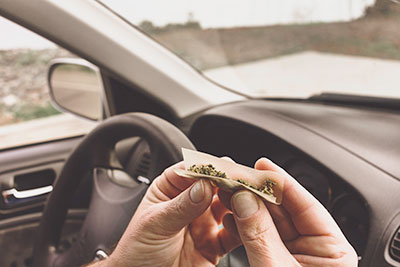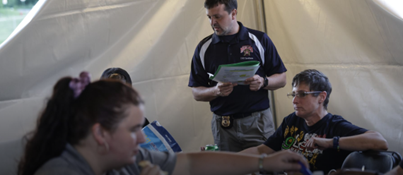
Between 2015 and 2019, an average of 29 people were killed and more than 800 injured each year in Maryland crashes involving a driver impaired by drugs – including illicit drugs and medications. Additionally, since 2017 over 800 crashes in the state have resulted in fatalities. With the legalization of recreational cannabis in Maryland beginning July 1, 2023, the state must train officers to detect cannabis-impaired driving.
To combat the pervasive issue of impaired driving, in 2021, the Maryland Highway Safety Office (MHSO) was awarded grant funding from Responsibility.org and GHSA to certify officers and instructors as Drug Recognition Experts (DRE), conduct cannabis and intoxication impaired driving labs and reduce the toxicology backlog by outsourcing the analysis of blood alcohol samples.
DRE Certification
Critical to the success of the DRE course was the partnership with the Pennsylvania DUI Association. The association provided an indoor facility for the evaluations, secured the volunteer subjects and provided oral fluid collection used by the students. Students representing Maryland State Police, the Maryland Transportation Authority Police, Baltimore County Police Department, National Security Agency Police, Fort Meade Police Department and the Harford County Sheriff's Office attended the course. This course increased the number of certified DREs across the state by 30%, from 170 trained officers in 2019 to 221 in 2022.

Implementation of Cannabis and Intoxication Labs
Officers also need to better determine the signs and symptoms of cannabis impairment, which dissipates rapidly. At a green lab, participating students observed volunteers who either consumed cannabis alone or cannabis along with a moderate amount of alcohol, with their blood alcohol concentration (BAC) not exceeding 0.05. The green lab allows officers to witness first-hand the impairing effects of cannabis and the duration of those effects. After the lab, attendees will be able to make a more informed decision about impairment, which can lead to an arrest and the ability to provide expert testimony.
Additionally, alerting the public that officers are trained to recognize cannabis impairment helps to change the social norm so that cannabis consumers refrain from driving after consumption. Media coverage of the green lab included an article in the Wall Street Journal, that dubbed it the “World’s Oddest Pot Party, Thrown by the Local Police.”

Toxicology Outsourcing
The third grant component focused on reducing the backlog of samples awaiting testing by the state’s forensic laboratory. The funds supported outsourcing while the MSP builds the necessary infrastructure to meet the demand for testing in-house. Over the 10-month period that blood samples were outsourced, the backlog decreased from 393 to 128.
Grant Impact
With more DRE instructors, the MHSO can now certify DRE officers much more efficiently. They can also provide more opportunities for officers to learn how to detect cannabis and alcohol impairment. In addition to increased training, improved timeliness of toxicology testing will positively impact the prosecution and adjudication of impaired driving cases.
Since MHSO was not able to promote the green lab activities due to privacy concerns, they found success by partnering with the Chesapeake Region Safety Council, which offered similar events and was able to promote the labs. MHSO recommends SHSOs discuss any limitations on marketing or media with partner agencies to gain a better understanding of content parameters when addressing impaired driving.
